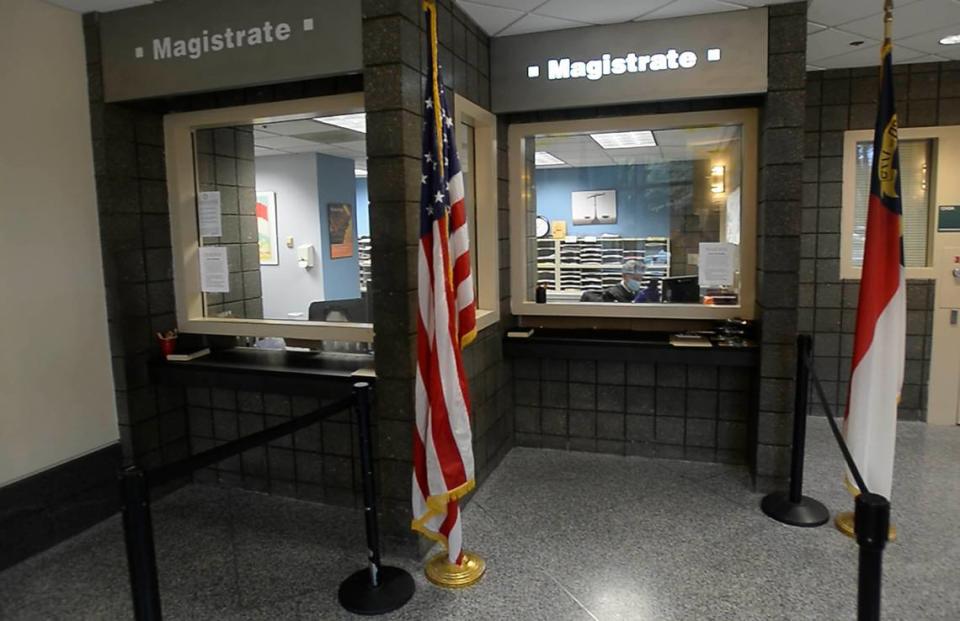Coronavirus drives domestic violence calls up — but also brings barriers to protection
With families sequestered at home to prevent the spread of COVID-19, domestic violence calls have risen, but so have the barriers to seeking court-ordered relief.
While most sessions in Mecklenburg County’s district court have been postponed, domestic violence court — which provides civil protective orders and hosts criminal proceedings — is still operating, but with limited hours, fewer courtrooms and fewer resources to help families.
The court is still granting protective orders, which give plaintiffs at least a week of court-ordered protection and in some cases, custody of children and possession of property. But domestic violence victims are having a harder time getting them. Some places that offer help have changed services and the county’s largest domestic violence advocacy group has stopped in-person services just as stress at home ramps up.
Clients at Safe Alliance, a Charlotte-based agency that helps survivors of domestic violence and sexual abuse, are also having to weigh whether going to the courthouse is worth the potential exposure to COVID-19, said Safe Alliance’s director of legal advocacy Ryan Stage.
And now the nonprofit’s support and legal staff can no longer accompany victims in court.
“It’s a double stressor and fear for them,” said Stage. “It takes the victim a long time to leave to begin with.”
Child care, remote hearings stopped
Domestic violence victims already had a hard time filing for emergency protective orders before the COVID-19 restrictions took place, said Paige McThenia, lead domestic violence judge for Mecklenburg district court.
Between going to work and finding transportation and childcare, plaintiffs often miss hearings that are scheduled on the same day that plaintiffs file. That results in an automatic dismissal, McThenia said.
Before the coronavirus restrictions, Mecklenburg’s courthouse had a daycare, McThenia said. Safe Alliance would provide an advocate for moral support and a lawyer for consultation or direct representation, Stage said. It also provided an electronic filing system, and victims could attend hearings with a judge through video conference in the privacy of a room at the Safe Alliance office, he said.
That allowed for victims to avoid having to travel to the courthouse in public, where they can be followed and harassed.
But now, Safe Alliance’s offices are closed and filing for a protective order through the clerk’s office is available only in the morning. The earliest a victim can meet with a judge for a hearing is the next morning.
Often, that means another night of trying to find housing that will accept children or pets, Stage said.
“When they do decide to leave, it is the most dangerous time …,” he said. “Because the defendant is either looking for them or they don’t have anywhere to go.”
Safe Alliance is still providing support and legal advice to clients, though services are done nearly all over the phone, Stage said. To limit exposure to other people, advocates and attorneys are not allowed to meet their clients in person or accompany them in court. The organization is also no longer taking on new clients for direct representation.
Last week, Mecklenburg district court officials said the courthouse will allow in only individuals required to appear in-person.
Domestic violence court is still in session for the trials that extend a restraining order, which can extend protection for a victim for a year.

Waiting in line for help
Barriers to seeking emergency protective orders couldn’t come at a worse time. With a stay-at-home order in North Carolina lasting at least through April 30, people have been forced together in the same home all day, elevating the possibility of violence and abuse, officials said.
According to Observer news partner WBTV, the Safe Alliance shelter in Charlotte has seen a 40% increase in calls.
“With the people that we are seeing, … they are cooped up and they are in that enclosed space so they need that protection now more than ever,” Stage said.
On Wednesday, Charlotte-Mecklenburg Police said there has been an 18% increase in domestic violence 911 calls compared to last March — an increase of around 517 calls.
CMPD Deputy Chief Gerald Smith said the department does not yet know whether the increase in calls is related to the stay-at-home order. Smith encouraged those needing help to reach out to Safe Alliance or other community resources.
“We are appropriately staffed to respond to domestic calls for service but right now it should be everyone’s goal to prevent these calls from coming in,” he said.
A victim who needs immediate help can wait in line to meet with a magistrate who can then confer with a judge and grant a restraining order, McThenia said.
The criminal magistrate’s office is still open 24-hours a day, but the process is far less private and the office is overwhelmed with requests, she said.
“It’s much less personal,” McThenia said. “The magistrate is behind glass and the victim is standing there trying to tell her story and (there are) other people in line behind her.”
And if the magistrate can’t get in touch with a judge — which can be the case in the dead of night — the victim might have to come back the next day.
Some criminal proceedings at domestic violence court have also been delayed. While the court is still in session for first appearances, bond hearings and probation violations, any criminal trials are delayed until further notice.
That means victims, already terrified by the prospect of testifying, have to wait a bit longer, McThenia said. With an unstable economy, she said that more cases will likely get dismissed if a plaintiff has to change housing and never notifies the court of a new address.
McThenia and Stage both said they aren’t sure when local services for domestic violence victims will improve.
“Honestly, nobody seems to know,” McThenia said. “We’re just trying to provide services to people in emergency situations with the neediest people (and) the neediest cases.”
Listen to our daily briefing:

